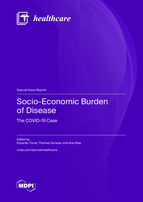Socio-Economic Burden of Disease: The COVID-19 Case
A special issue of Healthcare (ISSN 2227-9032). This special issue belongs to the section "Coronaviruses (CoV) and COVID-19 Pandemic".
Deadline for manuscript submissions: closed (15 December 2021) | Viewed by 52757
Special Issue Editors
Interests: human resource development; knowledge management; social policy; economics; intellectual capital; globalization
Special Issues, Collections and Topics in MDPI journals
Interests: CSR and transformational leadership; cross-cultural dimensions of diversity training; tacit knowledge in manufacturing; international human resource management standards; human resource management in MNCs; human resource development
Special Issues, Collections and Topics in MDPI journals
Special Issue Information
Dear Colleagues,
In recent months, humanity has faced an unprecedented challenge. Although we have dealt with many diseases over the centuries, never before have we faced a situation like COVID-19 [1]. Distinctive features of COVID-19 relate to the widespread use of instant information technologies, the absence of social and scientific knowledge on how to deal with the disease, and pressure on political and administrative bodies to restore safety. Never before has a disease shown the limits of the globalised world in the 21st century. The science is lacking and humanity must come to terms with the disease. Therefore, in this Special Issue, we invite papers on the social and economic consequences of disease, particularly of COVID-19. We invite you to:
- Analyse COVID-19 per se;
- Compare COVID-19 with other diseases or pandemics;
- Discuss and present case studies, national studies, comparative studies, historical analysis, or actor-centred studies;
- Analyse direct (health-related), indirect (economic and social), induced (political, ethical, or spirituality-related).
The studies may be quantitative, qualitative, or mixed-method.
Prof. Dr. Eduardo Tomé
Prof. Dr. Thomas Garavan
Dr. Ana Dias
Guest Editors
Reference
- The Worst Global Pandemics. Available online: https://www.publichealthonline.org/worst-global-pandemics-in-history/ (accessed on 9 October 2020)
Manuscript Submission Information
Manuscripts should be submitted online at www.mdpi.com by registering and logging in to this website. Once you are registered, click here to go to the submission form. Manuscripts can be submitted until the deadline. All submissions that pass pre-check are peer-reviewed. Accepted papers will be published continuously in the journal (as soon as accepted) and will be listed together on the special issue website. Research articles, review articles as well as short communications are invited. For planned papers, a title and short abstract (about 100 words) can be sent to the Editorial Office for announcement on this website.
Submitted manuscripts should not have been published previously, nor be under consideration for publication elsewhere (except conference proceedings papers). All manuscripts are thoroughly refereed through a single-blind peer-review process. A guide for authors and other relevant information for submission of manuscripts is available on the Instructions for Authors page. Healthcare is an international peer-reviewed open access semimonthly journal published by MDPI.
Please visit the Instructions for Authors page before submitting a manuscript. The Article Processing Charge (APC) for publication in this open access journal is 2700 CHF (Swiss Francs). Submitted papers should be well formatted and use good English. Authors may use MDPI's English editing service prior to publication or during author revisions.
Keywords
- Covid-19
- Pandemics
- Covid-19 in the scope of disease and pandemics
- Social and economic consequences
- Direct consequences – health system and health
- Indirect consequences – employment and income
- Induced consequences – politics, ethics, spirituality
- Case studies
- National cases
- Comparative studies
- Historical analysis
- Prospective analysis
- Actors centered analysis.









